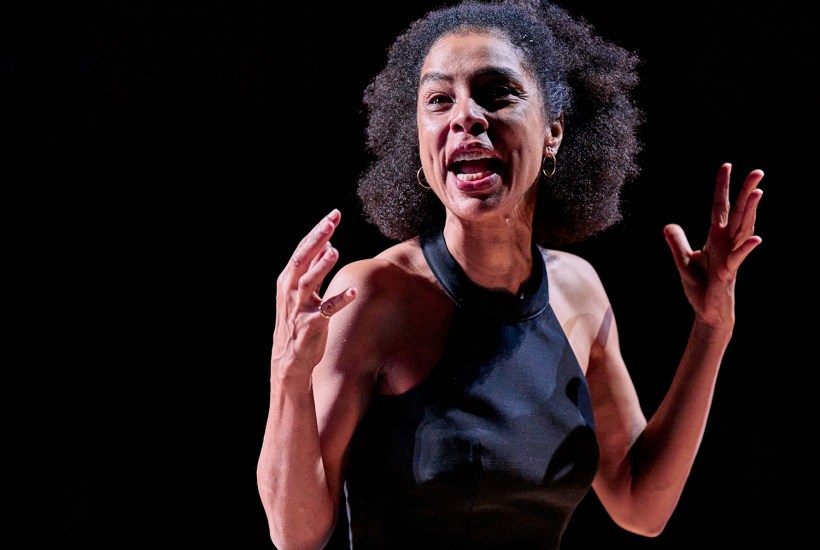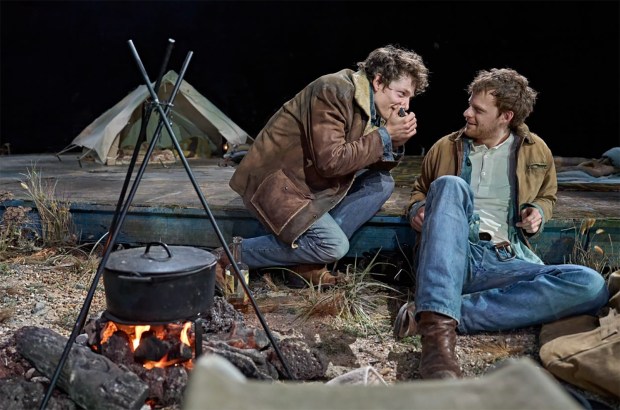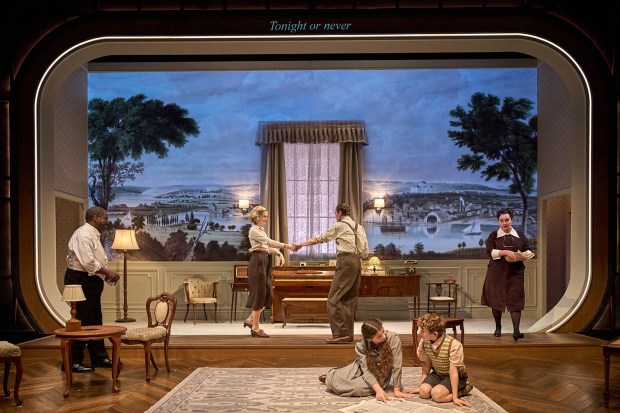Winner’s Curse is a hybrid drama by Dan Patterson and Daniel Taub which opens as a lecture by a fictional diplomat, Hugo Leitski (a dinner-jacketed Clive Anderson). Leitski offers to teach us the subtle art of negotiation. An expert diplomat, he explains, must convince each side that they’re the winners in the negotiation and that their opponents have lost. In his youth he helped to broker peace between two Slavic nations, Karvistan and Moldonia, and the action switches from Leitksi’s lecture room to a seedy hotel, the Black Lagoon Lodge, where the peace deal was agreed.
The lodge is run by a wonderfully sardonic widow, Vaslika, who asks each new guest which party they belong to. ‘Liars or blackmailers?’ As the talks continue, she stomps off to hunt wild game and keeps returning to the lobby with fresh prey slung from her shoulder: squirrels, seagulls, pigeons, pike and carp – at least that’s what they look like. Her long-lost husband’s ashes reside in an urn which Vaslika cradles tenderly. ‘He took seven bullets,’ she says, giving the urn a shake. The bullets rattle inside it.
The fast-moving comedy of the Moldonia scenes is varied with examples of deal-making enacted by the cast. Consider a Ming vase on sale in a market. The seller names his price, $5,000, and you offer him $100. If he accepts instantly, you will know that you overpaid. But suppose he reduces his price gradually, and with enormous shows of reluctance, while you increase your offer until a deal is reached at $3,000. You’ll feel assured that you made a terrific bargain. That’s the key. The specific terms are irrelevant. The emotional attitude of the deal-maker is crucial. Each side wants to believe that they’ve dragged concessions unwillingly from their rivals.
Leitski invites the audience to try their negotiating skills by arranging them into pairs to play at thumb-wrestling. He offers a free holiday to the person who wins the most bouts. At this point, many spectators realise that they must tell fibs in order to win the prize. And Leitski congratulates them for cheating. ‘All audiences are dishonest,’ he says. ‘But you’re the most dishonest I’ve come across.’ Clive Anderson’s skilfully improvised performance is the beating heart of this enjoyable comedy-lecture. Nichola McAuliffe (Vaslika) adds a farcical counterpoint to the brilliantly menacing Anton Korsakov, the chief negotiator, superbly played by Michael Maloney. Most play-goers will love this eccentric night of diplomatic knockabout. And it’s a must for anyone studying history or politics.
Dominic Cooke’s production of Medea is a stark, horrible and utterly gripping drama. The setting is Corinth, where an Asian princess, Medea, has fallen out with her Greek husband, Jason. The fate of their two children is uncertain and it’s likely that Medea will be executed or banished. The story unfolds like a true-crime TV re-enactment and the audience is drawn into the action by a chorus of women who maintain a running commentary throughout.
The play opens with Creon, the master of Corinth, ordering Medea and her children to leave the city immediately. He then congratulates himself on his kindness for refusing to kill them. Medea begs him to let her stay for 24 more hours and he accedes to her wish. He chuckles to himself again and boasts of his caring and generous nature. What he doesn’t realise, and what the audience understands in advance, is that his clemency will lead to his downfall.
Knowing the outcome of the story is not a drawback in a Greek tragedy. It’s crucial to the experience of tension and horror as the events unfold. We watch in real time as Medea decides what she must do. She arranges for Jason to spend an afternoon with his children and they play together affectionately as she observes from a distance. No dialogue is needed in this chilling family scene. The audience knows all too well what dark imaginings are germinating in Medea’s mind.
Sophie Okonedo is wonderfully glamorous as the damaged and dangerous princess. Ben Daniels simmers with malice as Creon and he creates a very different performance for the arrogant and gullible Jason. And he adds a camp turn as Aegeus, an Athenian grandee, who offers to rescue Medea. Vicki Mortimer’s design is spare, elegant and uncluttered – timeless almost. The script, taken from a 1946 translation, captures the raw, muscular essence of the original.
If you want to make physical contact with a Greek tragedy this is your chance. A show that approaches perfection. Dominic Cooke and his team must be urged to revive more plays from the Athenian dramatic canon. They deserve to be filmed as well to create a permanent record of what our theatre can achieve.
Got something to add? Join the discussion and comment below.
Get 10 issues for just $10
Subscribe to The Spectator Australia today for the next 10 magazine issues, plus full online access, for just $10.
You might disagree with half of it, but you’ll enjoy reading all of it. Try your first month for free, then just $2 a week for the remainder of your first year.














Comments
Don't miss out
Join the conversation with other Spectator Australia readers. Subscribe to leave a comment.
SUBSCRIBEAlready a subscriber? Log in